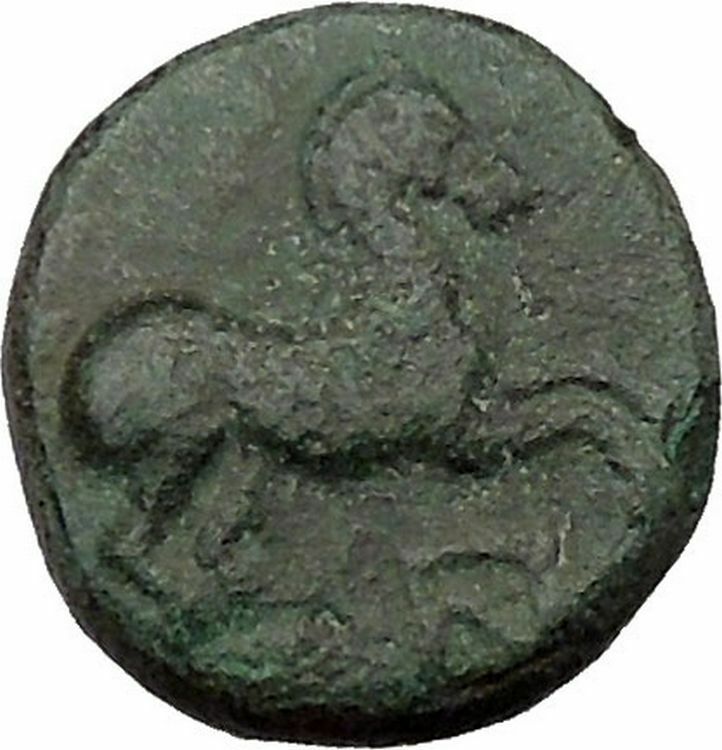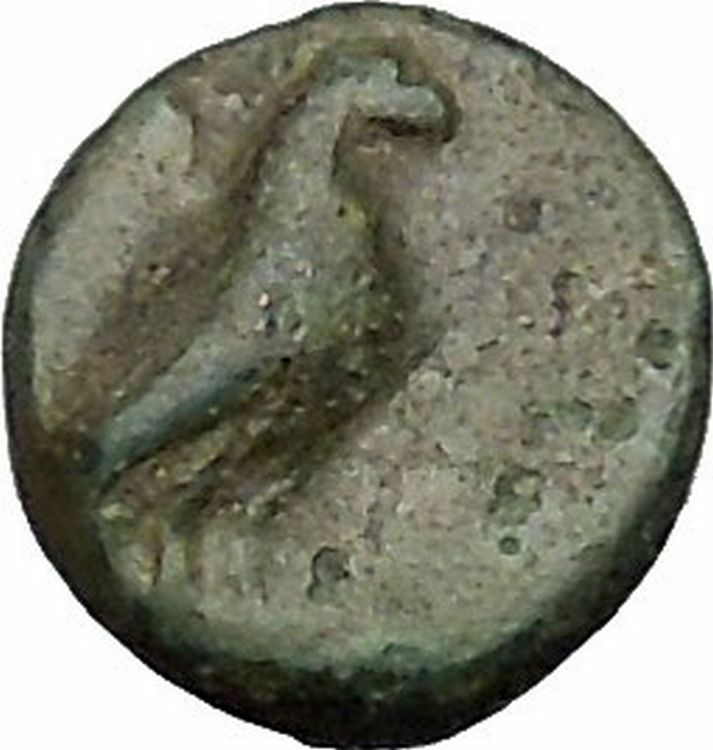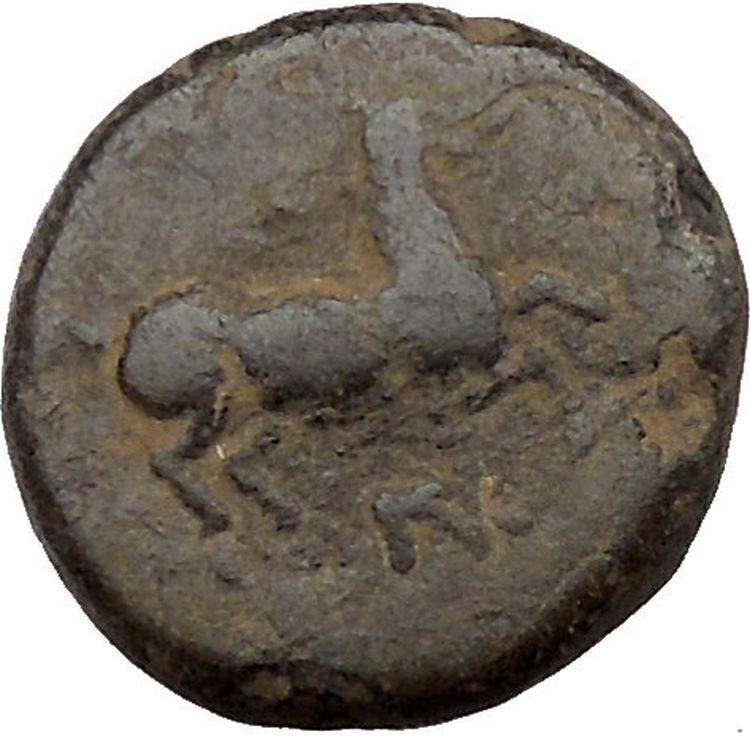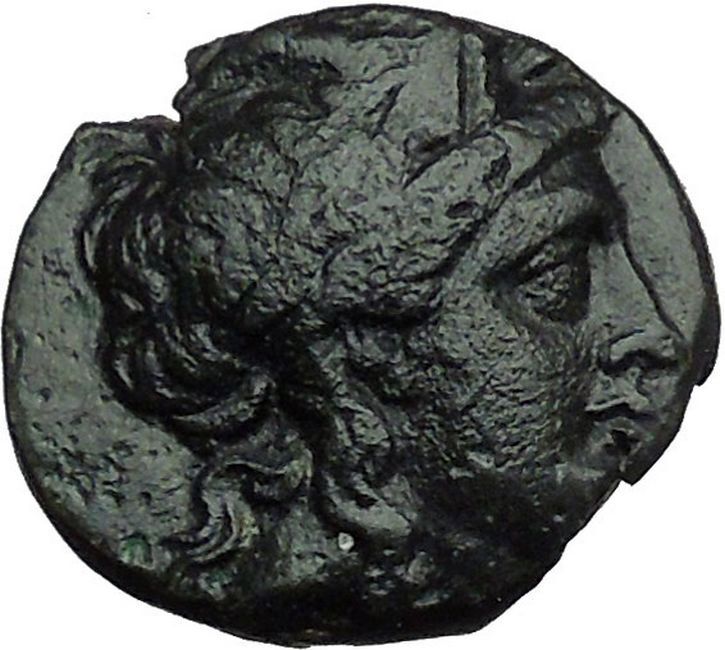|
Greek City of
Mytilene
chief city of the Island of
Lesbos
Bronze 10mm (0.84 grams) Struck circa 400-300 B.C.
Laureate head of Apollo right.
Lyre within square.
Lesbos was the largest of the islands off the coast of western Asia Minor,
Lesbos lay at the entrance to the gulf of Adramytteion. It was a great cultural
center, and its mild climate and fertile soil supported no less than five
cities, the most important of which was Mytilene. The chief city of Lesbos,
Mytilene was situated in the south-east of the island, opposite the mainland.
There can be little doubt that Mytilene was the mint of the important electrum
coinage of Lesbos in the 5th and 4th centuries.
You are bidding on the exact item pictured,
provided with a Certificate of Authenticity and Lifetime Guarantee of
Authenticity.
The lyre (Greek:
λύρα) is a
stringed musical instrument
known for its use
in Greek
classical antiquity
and later. The word comes
from the
Greek
“λύρα” (lyra) and the earliest
reference to the word is the
Mycenaean Greek
ru-ra-ta-e, meaning
“lyrists”, written in
Linear B
syllabic script. The earliest picture
of a lyre with seven strings appears in the famous
sarcophagus
of
Hagia Triada
(a
Minoan
settlement in
Crete
). The sarcophagus was used during the
Mycenaean
occupation of Crete (1400 BC). The
recitations of the
Ancient Greeks
were acco mpanied mpanied
by lyre playing. The lyre of classical antiquity was ordinarily played by being
strummed with a plectrum
, like a
guitar
or a
zither
, rather than being plucked, like a
harp. The fingers of the free hand silenced the unwanted strings in
the chord. The lyre is similar in appearance to a small harp but with distinct
differences.
The word lyre can either refer specifically to a common
folk-instrument, which is a smaller version of the professional
kithara
and eastern-Aegean
barbiton
, or lyre can refer generally to
all three instruments as a family.
The term is also used
metaphorically
to refer to the work or skill of
a poet
, as in
Shelley’s
“Make me thy lyre, even as the forest
is” or Byron’s
“I wish to tune my quivering lyre,/To
deeds of fame, and notes of fire”

In
Greek
and
Roman mythology
,
Apollo,
is one of the most important and diverse of the
Olympian deities
. The ideal of the
kouros
(a beardless youth), Apollo has been
variously recognized as a god of light and the sun; truth and prophecy;
archery
; medicine and healing; music, poetry,
and the arts; and more. Apollo is the son of
Zeus and Leto
, and has a
twin
sister, the chaste huntress
Artemis
. Apollo is known in Greek-influenced
Etruscan mythology
as Apulu. Apollo was
worshiped in both
ancient Greek
and
Roman religion
, as well as in the modern
Greco
–Roman
Neopaganism
.
As the patron of Delphi
(Pythian Apollo), Apollo was an
oracular
god — the prophetic deity of the
Delphic Oracle
. Medicine and healing were
associated with Apollo, whether through the god himself or mediated through his
son Asclepius
, yet Apollo was also seen as a god
who could bring ill-health and deadly
plague
as well as one who had the ability to
cure. Amongst the god’s custodial charges, Apollo became associated with
dominion over
colonists
, and as the patron defender of herds
and flocks. As the leader of the
Muses (Apollon Musagetes) and director of their choir, Apollo
functioned as the patron god of music and
poetry
.
Hermes
created the
lyre for him, and the instrument became a common
attribute
of Apollo. Hymns sung to Apollo were
called paeans
.
In Hellenistic times, especially during the third century BCE, as Apollo
Helios he became identified among Greeks with
Helios
,
god of the sun
, and his sister Artemis
similarly equated with
Selene
,
goddess of the moon
. In Latin texts, on the
other hand, Joseph Fontenrose declared himself unable to find any conflation of
Apollo with
Sol
among the
Augustan poets
of the first century, not even
in the conjurations of
Aeneas
and
Latinus
in
Aeneid
XII (161–215). Apollo and Helios/Sol
remained separate beings in literary and mythological texts until the third
century CE.
Mytilene (Greek:
Μυτιλήνη) is the
capital
city
of
Lesbos
, a Greek island
in the
Aegean Sea
,
and capital of
Lesbos Prefecture
and the Northern Aegean region. It is built on the
southeast edge of the island. Mytilene, whose name is pre-Greek, is also the
seat of a metropolitan
bishop
of the
Orthodox church
.
As an ancient city, lying off the east coast, Mytilene was initially confined
to an island that later was joined to
Lesbos
,
creating a north and south harbour.[
neededcitation] Mytilene contested successfully with
Methymna
in the north of the island for the leadership of the island in the
seventh century BC and became the centre of the island’s prosperous hinterland.[
neededcitation] Her most famous citizens were the poets
Sappho
and
Alcaeus
and the statesman
Pittacus
(one of the Seven Sages of ancient Greece). The city was famed for
its great output of
electrum
coins struck from the late 6th through mid 4th centuries BC.[2]
Mytilene revolted against Athens in 428 BC but was overcome by an Athenian
expeditionary force. The Athenian public assembly voted to massacre all the men
of the city and to sell the women and children into slavery but
changed its mind
the next day. A fast trireme sailed the 186 nautical miles
in less than a day and brought the decision to cancel the massacre.
Aristotle
lived on Mytilene for two years, 337-335 BC, with his friend and successor,
Theophrastus
after becoming the tutor to
Alexander
, son of King Philip II of Macedon.[3][4]
The Romans, among whom was a young
Julius Caesar
, successfully besieged Mytilene in 80 B.C. Although Mytilene
supported the losing side in most of the great wars of the first century BC her
statesmen succeeded in convincing Rome of her support of the new ruler of the
Mediterranean and the city flourished in Roman times.
In AD 56
Paul the Apostle
stopped there on the return trip of his third missionary
journey(
20:14Acts).
|




 mpanied
mpanied



